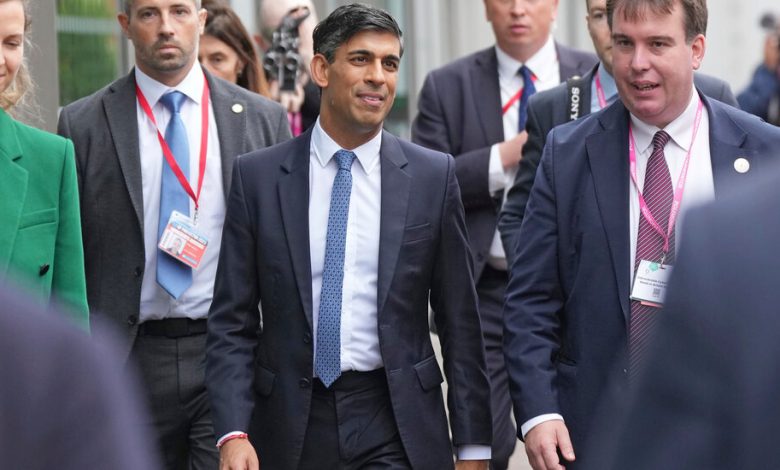Ghosts of Struggles Past and Future Haunt U.K. Conservative Showpiece

Perhaps it’s inevitable for a political party that has held power in Britain for nearly 14 years, but the Conservative Party’s annual conference is rattling with the restless ghosts of its past and future.
On Monday, Liz Truss, the prime minister ousted a year ago after her proposed tax cuts upended financial markets, stole the limelight with a well-attended speech on the sidelines, arguing that Britain should cut taxes on corporations.
On Tuesday, the home secretary, Suella Braverman, was expected to use her speech to appeal to the party’s hard right as she jockeys for position along with a flock of other would-be leaders who would like to replace Prime Minister Rishi Sunak at the head of the party if he loses a general election next year, as polls currently suggest he would.
It is against this noisy backdrop that Mr. Sunak will speak on Wednesday. He hopes to use the gathering to reset his own ailing political brand and set out a case for why voters should keep the Conservatives in power. Neither of these goals is helped by the dissident voices competing for attention in the convention center in Manchester.
Ms. Truss’s appearance was an unwelcome reminder of her brief, tumultuous tenure, which spooked investors, spiked mortgage rates, and sent the pound into a tailspin. Her departure cleared a path to Downing Street for Mr. Sunak. But rather than fading away, Ms. Truss has energetically defended her trickle-down policies, even at the cost of opening a fresh rift in the party over taxes.
Ms. Braverman, who is slated to speak on Tuesday afternoon, has staked out a hard-line position on immigration, calling in a recent speech in Washington for harsher rules on asylum seekers. Her statements have made her a favorite of the political right. But they could well turn off voters who are already offended by Britain’s plan to put asylum seekers on one-way flights to Rwanda.
“It’s a really tricky situation for any prime minister,” said Anand Menon, professor of European politics at King’s College London. “There is a battle going on for the soul of the party and who will lead that new party.”
Such family rivalries are not new in the Conservative Party, he said. Boris Johnson, before he became prime minister, used to turn up at these conferences as a gleeful insurgent, often overshadowing the leader of the day. Mr. Sunak has tried to counter the distractions by rolling out a series of populist policies on climate and energy that he hopes will cast him as a man of action.
But he is doing so at an acutely fraught moment, with the Tories trailing the opposition Labour Party by double digits, exhausted and divided after their long stretch in government; and struggling to fulfill their promises, whether to cut Britain’s high inflation rate or its lengthy waiting lists at hospitals.
At cocktail parties in Manchester, the hottest gossip was that Mr. Sunak would announce the government is scrapping part of an ambitious high-speed rail line, known as HS2, that would connect northern England cities with London — an odd message for a gathering in one of those cities, and meant to showcase a party investing in Britain’s future. Mr. Johnson, though no longer a lawmaker and not in Manchester, has warned against the decision.
Even the gathering’s logistics contributed to the image of a house divided. On Monday Ms. Truss arrived at the conference hotel a few minutes after the chancellor of the Exchequer, Jeremy Hunt, in a motorcade identical to his — a reminder of her status as a former prime minister, albeit one who served just 44 days.
Party members stood in line an hour before her speech at what was called the “Great British Growth” rally, dedicated to promoting her agenda of lowering taxes and reducing regulation to stimulate the economy.
Mr. Hunt, whose priority is to tame inflation, has ruled out cutting taxes in the short term, but faces growing internal pressure. Many Conservative lawmakers hope tax cuts will be announced before the next election and more than 30 of them recently signed a letter pledging not to vote in Parliament for any new tax hikes.
Ms. Truss called for the main tax rate on corporations to be cut to 19 percent or lower, from 25 percent, and claimed that reducing red tape and increasing tax incentives could boost house building to produce 500,000 units a year.
“We need to acknowledge that the government is too big, that taxes are too high, and we are spending too much,” she said, in words that could have been drawn from her stump speech during her leadership campaign in 2022.
Economists have not revised their verdict on Ms. Truss since she left. Her emphasis on tax cuts misses the point of what has held back the British economy, many said, namely a dearth of public and private investment that has hobbled productivity and hollowed out institutions like the National Health Service.
“The U.K. is not overtaxed,” said Jonathan Portes, a professor of economics and public policy at King’s College London. “Taxes need to go up, not down, to restore public services and meet demographic pressures.”
“Truss does have a point that we need aggressive pro-growth policies in some areas: housing, planning, infrastructure, skills,” he added. “The government has failed to deliver these, and in some respects is going backward.”
Ms. Truss still has supporters, and they gave her an enthusiastic reception, posing with her for photos as she pushed her way to the exit.
“She’s one of the few people within the party who has the ambition and the vision to change things in our economy,” said Edward Todd, a Conservative Party member from High Barnet, in outer London.
With so many members gathered in one place, the conference offers an unmatched platform for those with leadership ambitions to raise their profile. But in doing so, those vying to succeed Mr. Sunak inevitably stoked internal tensions on issues even more emotive than taxes.
Kemi Badenoch, the business secretary, waded into the charged debate over trans rights. “I will not apologize for fighting for a society that knows what a woman is,” she declared.
Ms. Badenoch, who is seen as a right-wing rival to Ms. Braverman, echoed her hard line on migration by arguing in a newspaper interview that quitting the European Convention on Human Rights was “definitely something that needs to be on the table.” Critics of the convention blame it for legal challenges to the plan to send asylum seekers to Rwanda.
But the issue divides the party. Tom Tugendhat, the security minister, said he worried that leaving the convention would affect Britain’s other international obligations and treaties, including the Good Friday Agreement on Northern Ireland and Britain’s Brexit trade deal.
For her part, Ms. Braverman traveled to Washington to argue that not just the European Convention on Human Rights, but also the United Nations convention on refugees, needed to be overhauled. And she used strikingly blunt language to describe the limits to what she called acceptable claims for asylum, drawing expressions of outrage from the singer Elton John and L.G.B.T.Q. activists in her own party.
“There are vast swathes of the world where it is extremely difficult to be gay, or to be a woman,” Ms. Braverman said at the American Enterprise Institute, a right-leaning think tank.
“Where individuals are being persecuted, it is right that we offer sanctuary,” she continued. “But we will not be able to sustain an asylum system if in effect, simply being gay, or a woman, or fearful of discrimination in your country of origin, is sufficient to qualify for protection.”





